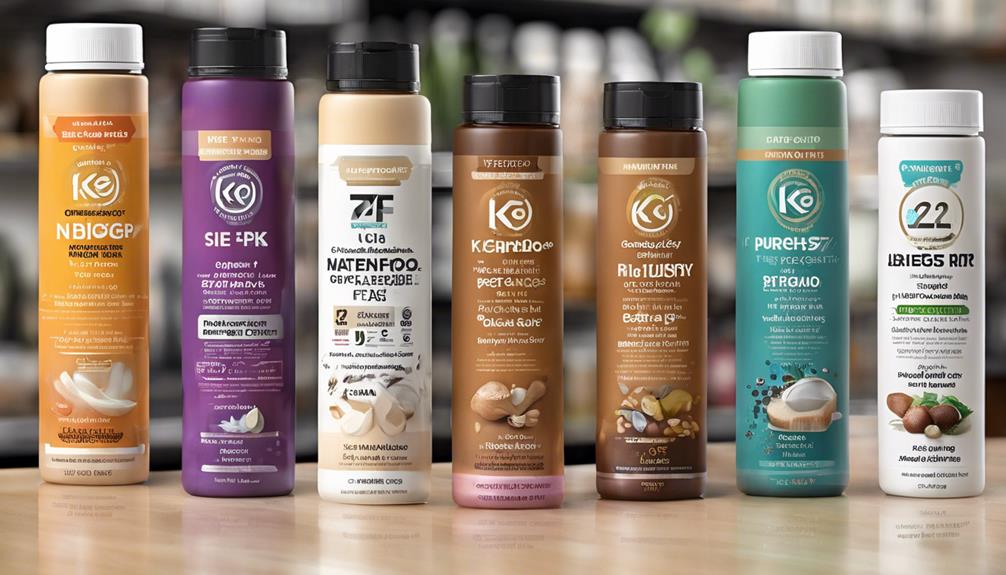Navigating the realm of baby formula feeding often resembles embarking on an unknown expedition. There’s an abundance of details to process and choices to be made, making it simple to become swamped with feelings of being overwhelmed.
However, fear not, for we have compiled a detailed guide to exclusive formula feeding that will equip you with the knowledge and tools needed to confidently traverse this territory. From selecting the right formula to addressing common feeding challenges, this guide is designed to support caregivers every step of the way in providing ideal nutrition for their little ones.
Key Takeaways
- Choose the right formula based on individual needs and preferences.
- Establish a flexible feeding schedule to meet the baby's demands.
- Recognize signs of formula allergies and seek medical advice promptly.
- Consider different formula options and consult healthcare providers for guidance.

Similac Advance Infant Formula With Iron, Baby Formula Powder, 30.8-oz Value Can
GET MORE REWARDS POINTS: Scan the MySimilac QR code on select products to earn points toward a Reward
As an affiliate, we earn on qualifying purchases.
As an affiliate, we earn on qualifying purchases.
Choosing the Right Formula
When selecting the most suitable formula for your baby, it's important to consult with a pediatrician to tailor your choice based on your baby's individual requirements and any potential allergies or sensitivities. Types of formula to contemplate include soy formula for babies with lactose intolerance or milk protein allergies, hypoallergenic formula for those with sensitivities, and iron-fortified formula to support your baby's growth and development. You can opt from ready-to-feed formula for convenience, powdered formula for cost-effectiveness, or concentrated formula for flexibility. Your pediatrician can provide valuable recommendations on the best formula options based on your baby's needs.
As your baby approaches their first birthday, discussing with your healthcare provider the switch to cow's milk and the appropriate timing for this change is crucial. Understanding the different formula categories available and seeking pediatrician guidance can help you make informed decisions to support your baby's health and well-being.

Similac 360 Total Care Infant Formula, Has 5 HMO Prebiotics, Our Closest Prebiotic Blend to Breast Milk, Non-GMO,‡ Baby Formula, Ready to Feed, 2-fl-oz Bottle, Pack of 12
Halal
As an affiliate, we earn on qualifying purchases.
As an affiliate, we earn on qualifying purchases.
Establishing a Feeding Schedule

To establish a feeding schedule that meets your baby's needs, it is essential to observe their hunger cues and adjust formula amounts accordingly. Babies often need to feed infant formula multiple times a day to guarantee they receive adequate nutrition. Initially, newborns might consume 1-2 ounces of formula every 2-3 hours, gradually increasing as they grow. By one month, this may shift to 4 ounces every 4 hours. Infants generally require around 2.5 ounces of formula per pound of body weight daily, but individual needs vary. As a rough guide, babies typically drink about 5 ounces of formula per pound of body weight. It's vital to pay attention to your baby's hunger cues and adjust the feeding schedule and amounts accordingly. Below is a table summarizing the general guidelines for feeding amounts based on a baby's weight:
| Baby's Weight (lbs) | Daily Formula Intake (oz) |
|---|---|
| 6 | 15 |
| 8 | 20 |
| 10 | 25 |
| 12 | 30 |

Enfamil Nutramigen Hypoallergenic Baby Formula with Iron, Lactose Free, Colic Relief from Cow's Milk Allergy Starts in 24 Hours, Brain Building DHA, Probiotic LGG for Immune Support, 19.8 Oz Can
HELPS TO EASE COLIC: Delivers Clinically-Proven Relief when managing colic due to cow’s milk allergy for a happier,…
As an affiliate, we earn on qualifying purchases.
As an affiliate, we earn on qualifying purchases.
Signs of Formula Allergy
Observing your baby for signs of a formula allergy is vital as it can present through various symptoms like skin rashes, gastrointestinal distress, or respiratory issues. Sometimes, it can be challenging to pinpoint the exact cause of your baby's discomfort, but being attentive to these signs can help you identify a potential formula allergy early on.
- Skin rashes, hives, or eczema may appear, causing your little one discomfort and distress.
- Gastrointestinal symptoms such as diarrhea, constipation, or excessive gas can be alarming for both you and your baby.
- Respiratory symptoms like wheezing, coughing, or nasal congestion may indicate a reaction to the formula.
If you notice any of these signs or if your baby seems colicky, excessively fussy, or irritable after feeding, it's essential to consult with a pediatrician promptly. Seeking professional guidance can lead to a proper evaluation and potentially a switch to a hypoallergenic formula, ensuring your baby's health and comfort.

INTTERO Baby Bottles with Built-in Formula Dispenser, Anti-Colic Wide Neck Design for Newborn Feeding and Everyday Baby Essentials, 9 Oz Medium Flow (2 Pack), Stylish White
𝗘𝗮𝘀𝘆 𝗙𝗼𝗿𝗺𝘂𝗹𝗮 𝗣𝗿𝗲𝗽𝗮𝗿𝗮𝘁𝗶𝗼𝗻 – Built-in baby formula container to go lets you mix bottles instantly with one hand…
As an affiliate, we earn on qualifying purchases.
As an affiliate, we earn on qualifying purchases.
Types of Formula Options

Exploring the diverse array of formula options available can provide parents with tailored choices to meet their baby's specific dietary needs and preferences.
Cow's milk-based formulas, fortified with essential nutrients like iron, are commonly used for healthy growth.
Soy-based formulas offer a plant-based protein source, ideal for babies with milk allergies or lactose intolerance.
Hypoallergenic formulas, easier to digest, cater to infants with cow's milk protein allergies, reducing the risk of allergic reactions.
Specialized formulas are designed for specific cases such as premature infants or babies with metabolic disorders, addressing unique nutritional requirements.
Whether addressing milk allergies, providing plant-based options, or meeting specific nutritional considerations, the variety of formula options ensures that parents can find the most suitable choice for their baby's well-being.
Consulting healthcare providers is crucial to determine the most appropriate formula for your baby's individual needs.
Transitioning Between Formula Brands
Shifting between formula brands requires a gradual adjustment period to allow your baby's digestive system to acclimate smoothly. When changing brands, it's important to keep a close eye on your little one for any signs of digestive discomfort or allergies.
To guarantee a smooth switch, follow these tips:
- Start Slow: Begin by mixing the current formula with the new one in increasing ratios over 1-2 weeks.
- Monitor Closely: Watch for any signs of digestive issues or allergic reactions during the adjustment period.
- Consult a Professional: If your baby experiences persistent problems or if you have concerns about the switch, don't hesitate to reach out to your pediatrician for guidance.
Frequently Asked Questions
How Do You Exclusively Feed Formula?
We exclusively feed formula by preparing bottles with the recommended amount of formula and feeding our baby according to their hunger cues. We guarantee the formula meets their nutritional needs, allowing us to monitor their intake accurately.
How Long Can You Exclusively Formula Feed?
How long can we exclusively formula feed? We can safely continue exclusive formula feeding for the entire first year of our baby's life. Consult our pediatrician to make sure our little one's nutritional needs are met effectively.
What Percentage of Babies Are Exclusively Formula Fed?
We can understand the curiosity about exclusive formula feeding rates. It's estimated that about 25% of newborns in the U.S. are exclusively formula fed. By 6 months, this number rises to approximately 75%.
What Is the Closest Formula to Breast Milk?
When seeking the formula closest to breast milk, opt for a cow's milk-based formula with added nutrients. Consider DHA and ARA for brain development, and specialized options like hydrolyzed formulas for sensitive tummies. Look for prebiotics and probiotics too.
Conclusion
To sum up, selecting the appropriate formula and setting up a feeding timetable are vital steps in guaranteeing your baby's well-being. Keep an eye out for signs of formula allergy and be prepared to switch between formula brands if necessary.
Remember, Rome wasn't constructed in a day, so be patient with yourself and your little one as you navigate the world of exclusive formula feeding. Your dedication and care will make all the difference in your baby's health and happiness.









